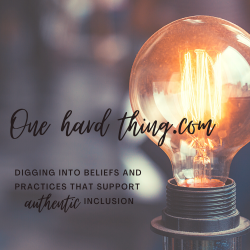It is very helpful, I think, to respect that every single person I interact with holds values, and lives by them. This means that all of us, even the people I really disagree with, are principled and have integrity.
I realize that it is very hard to understand what exactly is driving the behaviour of people whose values are very different from my own, or who stack their values in a different order than I do. But it is much easier to dialogue with those I disagree with if I resist the urge to think of others as having no values, while I retain the moral high ground and live by the only possibly appropriate values (i.e. the “correct” values for this situation). Assuming the moral high ground is the first step in “othering” people, and it can be devastating in its outcomes.
Instead, it is more useful in a collaborative venture (assuming we do not want to deteriorate into a war that no one can possibly win) to look at our value systems objectively, and as separate from our personhood. We each make choices, and those choices are both determined by what we value most, and also lead to us refining and adapting our value structures in more and more nuanced ways. This is great work – really, the work of ethical, intentional living. We are all doing it, but some of us are doing it with more awareness than others. Values are not who we are, but they’re close, because our values do tend to become a reliable container for our actions, and so can sort us into groups who agree, or disagree, in any particular problem-solving scenario.
So, if we look at each other with thoughtful and respectful compassion for the forks in the road that have led to our particular core beliefs and intentions, maybe we can talk rationally about options. None of us are value-less. None of us are even illogical, although we may seem so to those around us. We are making the choices that make sense and align with what we hold as precious. And anything that anyone holds as precious is precious, to that person, and should not therefore be dismissed or disregarded.
This is not to say that in an endeavour, everyone can hold true to their own hard-won value system and resist any changes. That won’t get a team anywhere. However, stacking values is something that can be done within a context and with boundaries around the goal of the team, so as to allow people to keep their own hierarchies intact in other, more personal contexts. If talking about values is safe – that is, if no one feels attacked by another person for holding a value up higher than another thinks it should be – then negotiating within a particular context, and for a particular aim, is possible.
I like to think of values as stacked, like steps. This is because the most important values tend to hold up the others. For instance, freedom of speech is a critical value that allows for other values to exist. Without uncensored communication, options drastically reduce, and quickly. We need to speak our truth to each other because none of us know precisely what it is like to be the other. Without free speech, we cannot work together, and without working together, some of us won’t survive.
But…close behind freedom of speech (or above, in this metaphor) is the concept of respect for others. If my freedom causes harm to you, then I need to restrict my use of that freedom. The second value thus constrains and sharpens the function of the first. These two values could be argued (and are) as to relative positions on a hierarchy, but they are indisputably both foundational to an inclusive society.
So this hierarchy, in my mind, moves from most to least important, up. It’s relatively easy to agree on the bottom or foundational values. Human rights are like a bottom step for our justice system. Rights of the child govern anyone who wants to help children. Respecting the rule of law, within a democracy, is also fundamental to forward planning for most missions.
Above these core values, we start to diverge based on temperament, interest, experience, and what we are trying to do. Scientific projects value different forms of expression than arts projects. Education values different activities and outcomes than does health care. Religious organizations value and work towards different goals than businesses. This is all okay, and adaptive, and useful in a functioning society.
As a team, then, working towards a defined outcome, it is helpful to have team discussions about how to stack values so as to give the team the highest chance of meeting the desired outcome. Some teams will value competition, while others will value cross-pollination of ideas. Some teams will value hard work in specific seasons, while others value low and slow percolation of ideas and efforts. Some teams need hierarchy due to the complexity and precision of planning, while others are going to do better just winging it.
Values aren’t good or bad. They just are. Stacking values does not make one morally better or worse, it just will be more or less useful within a particular context. When we stack values in a useful and transparent and non-judgemental way, we optimize the efforts of a diverse crew of people. We do not disrespect the values represented in their lives, and in fact we welcome their particular perspectives, which have been shaped by living out their values. However, values can move in a hierarchy, and this can be responsive to the context. Keeping values separate from our individual identities is extremely important to the work of ethical living in a social setting.
The opposite of stacking values is to weaponize them. This is when we double down on our own particular value system and identify with it as the only “right” way to live. We become defensive, and we also equate our values with moral superiority and even with the will of God, however we conceptualize this entity. This of course justifies almost any action to protect our values from being disagreed with. Furthermore, because we have identified so closely with them as to be indistinguishable from our values, it can even mean people who disagree with our values must not agree with our own humanity. We fight back, and often the war becomes nuclear.
Value systems do require thoughtful, intentional work. This work can be done unconsciously, and with little effort, but the likelihood that we will live out second-hand beliefs and stereotyped ideas becomes very high in that case. Putting conscious effort into our own structures of intention and belief is well worth the time and energy it takes. This goes for teams as well, of course, and the more discussion is encouraged and facilitated, the more likelihood that creative rearranging will seem possible and safe for all involved.
So, give yourself a pat on the back. You 100% have values, and they are organized in some way. Yes, you could be more aware and intentional about that, but hey, you’ve come this far and that has taken principled living! You probably have unique stacks of values in unique circumstances that have kept you alive and functional. Celebrate that. And know that values can move, can be rearranged, can evolve with your growing wisdom, experience, and ideals. Your values are fundamental to who you are, but they are not you. You get to choose them, not the other way around.
And if you are a team member, relax and enjoy the creative ways that other people have chosen to arrange and live out what they find important. They’re not wrong. You’re not wrong. We’re all just doing the best we can with the situations we find ourselves in. Let’s help each other and build on each other’s good work, rather than going to war for a futile cause and missing out on what could be the most constructive type of conversation.


